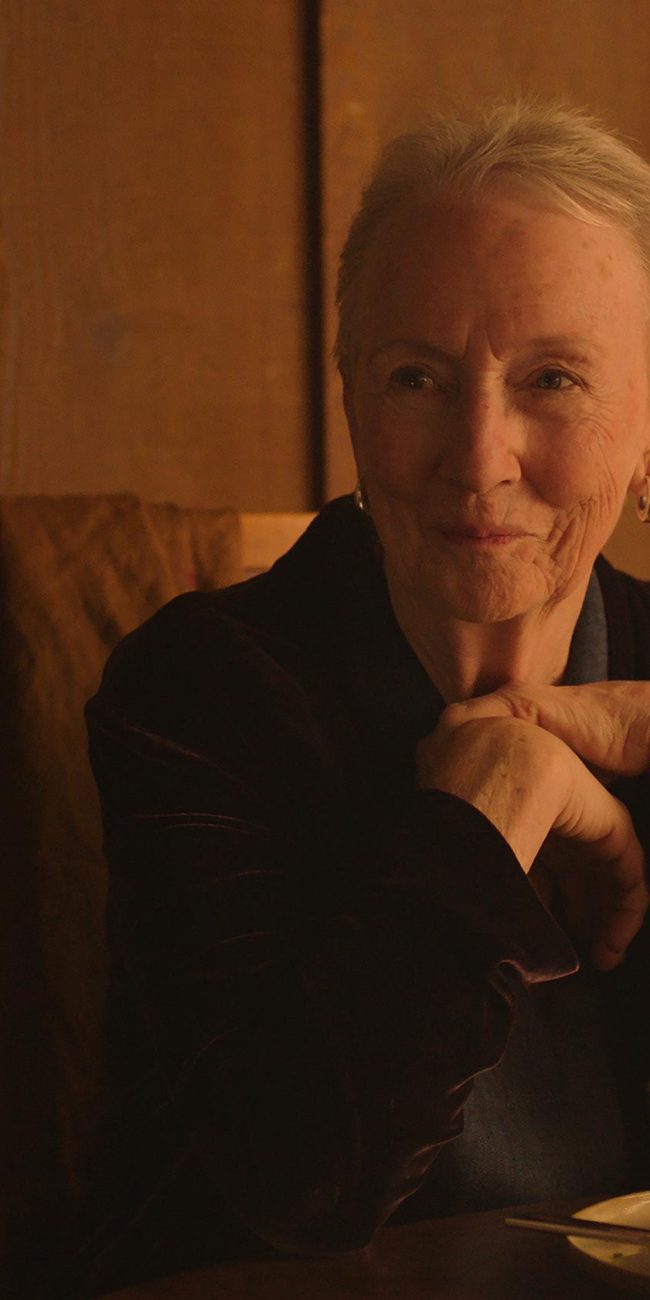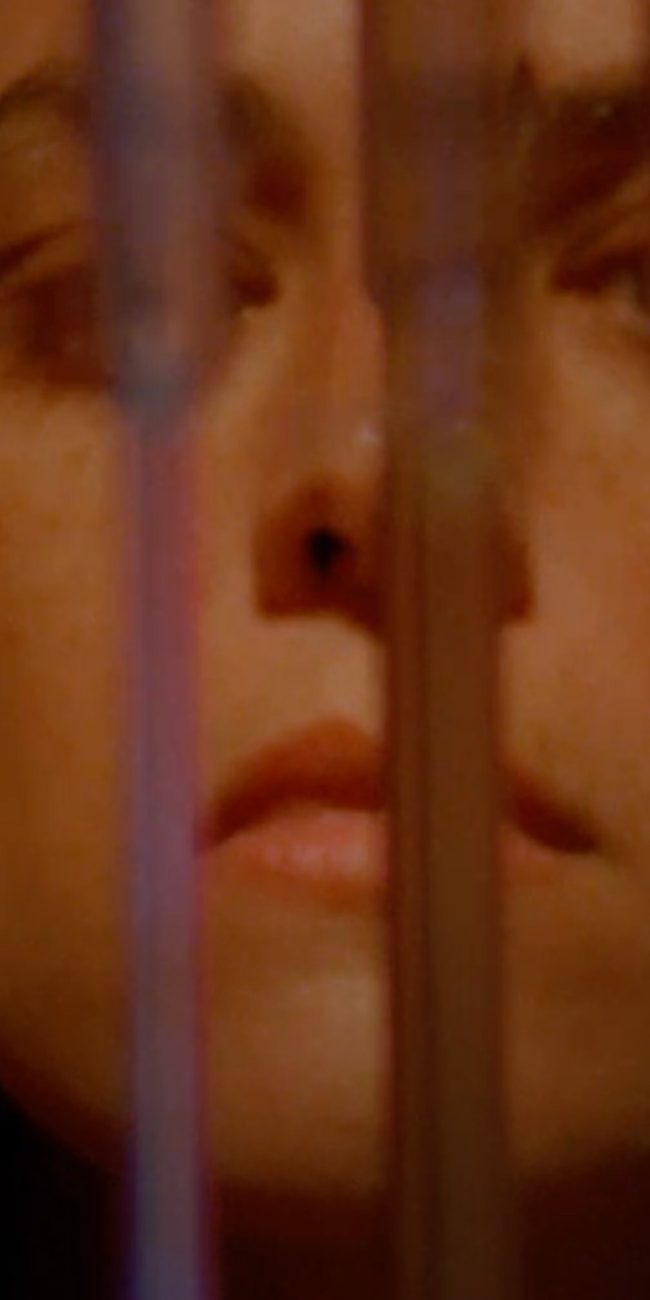A Conversation with Mickey Keating (INVADER)
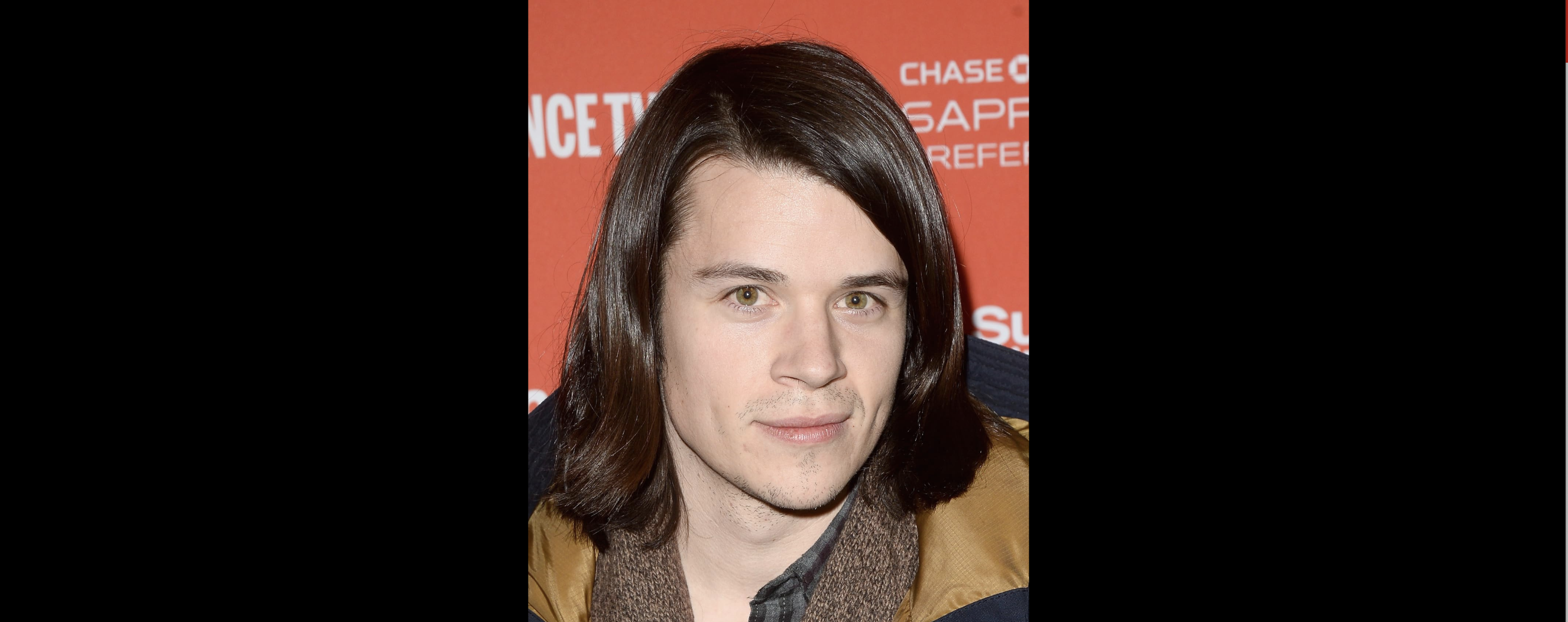
Invader may not be for you. Director Mickey Keating has made a film that shows you what it is immediately and if you need to walk out after five minutes he’s okay with that. He has given you permission. But if you do give him 70 minutes of your life, he rewards the viewer with a ferocious assault on modern middle-class tranquility that is far more frightening than an slasher or fantastical monster film. Nightmares are safely tucked away on Elm Street but as the FBI warning at the top of Invader states, “a break-in occurs every 30 seconds in the United States,” and Keating would like to remind you that is happening on Your Street.
Coming from Music Box Films, Invader stars Joe Swanberg as the film’s namesake as well as producer (with Amanda Brinton and Edwin Linker) and two LatinX future stars Vero Maynez and Colin Huerta. Maynez shines on screen as Ana, a visitor to the US who shows up in the Chicago Suburbs to find her cousin missing and someone else in her cousin’s home. I won’t reveal any more because a lot of the fun of the film is trying to put together the pieces with Ana.
Every Mickey Keating film is an opportunity to peer into the darkest corners of his mind, each film a different corner. Instead of retreading the typical horror tropes trying to ‘crack’ the formula to studio horror, he challenges himself as he challenges his audience. Every twist feels as authentic as if we were there when the thought crossed Keating’s screenwriting software. Or improvised in the moment of shooting, to which the run-and-gun style of Invader sometimes led itself.
I had a chance to sit down with Keating just before the film makes its theatrical run on February 21. This isn’t a typical interview for me, this is the fourth or fifth time we’ve done this, [read my prior interview with Keating about Offseason here] but I’m really excited to talk about this one because it is both so direct but also so open-ended. Also, there is one particular affectation that the antagonist displays that Keating hasn’t spoken about in previous interviews [that I’ve read] it seems, and I need to hear his answers.
Hammer to Nail: It feels like three years is a perfectly fine amount of time between projects for everyone else, but for you, it seems like a really long time.
Mickey Keating: Yes, yes. I mean, we made this movie right after Offseason, pretty much, within the same year. Joe [Swanberg, star of both Offseason and Invader] came down to Florida to film Offseason, and I was really just inspired by him. While the world was literally crashing and burning, and when it seemed like it was time to try to figure out how to make movies again in this new terrain, because at the time we could have never made a movie like Offseason he called me and he was like, “Do you want to come to Chicago and do a movie my way?” Which was essentially a crew of … there was nobody on the crew. It was like eight people or something. It was an effort to make it very documentary-esque, super handheld, off-putting, which was the fun challenge because coming from Offseason, which is so very militant.
HtN: Very composed. Everything is still. A lot of long shots. It’s almost a reverse reflection, Offseason and Invader.
MK: Absolutely. I was like, “Now I want to make an ugly movie. I want to make an off-putting movie in that way.” That was the effort. We actually finished the film, and then Offseason came out and I really didn’t want to have it overlap much.
HtN: Yeah. I was looking back over our last interview for Offseason, and at the very end you said something like, “Oh, I’m in post-production on my next film, so I should get to talk to you soon.” I guess that must’ve been that one.
MK: Yeah, yeah. It used to be like, “Oh, it’s been six months, I have to make another movie.” Now like I blink and suddenly it’s two years later, three years later.
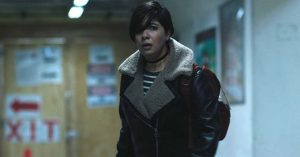
A still from INVADER
HtN: It’s fun that you made such a different film. Like the opposite of all the long atmospheric shots in Offseason, this one I was super aware how close the camera is to the actors through the whole movie. It’s very upsetting. In a good way. You feel trapped with the characters.
MK: This was really an effort, almost like the way I did black-and-white with Darling. The movie is an ugly film. Very early on, if you think it’s too nauseating, if you’re too troubled by it, it gives you an out pretty quickly.
HtN: What was that like, to make a film in that way, for you?
MK: In the effort to really take all my tools away, the movie was very improvised. Also, I was inspired by documentary, having the camera almost be complicit or like a third character. It was really interesting to me. Even films by [Belgian Filmmaking Brothers] the Dardennes, or just that effort to go as far away from Offseason and what I am usually known for as possible. Then simultaneously, I thought that if I’m going to make a movie with handheld photography, it has to essentially make the audience aware of handheld again, because now it’s big films too and no one notices it anymore.
HtN: Yeah. It’s like reclaiming. You’re reclaiming handheld as a tool as opposed to an excuse. “Oh, well, we shot it fast.”
MK: Absolutely. It was fun. I use the same camera guys for every single movie, and I think they were really troubled by the fact that I kept pushing them. I would tell Vero [Maynez, who plays Ana], “Go this way. Don’t let them anticipate. Go this way and they have to catch up with you.” It was very freeing and exciting for me to set up that challenge for everybody, much to the chagrin of Mac [Fisken, Cinematographer].
HtN: What about interacting with the actors, especially if it’s a little more improvised, but also if you’re standing right there right next to the camera and they’re right in front of you?
MK: Yeah, it was so crazy about both those two young actors. Vero and Colin [Huerta], who plays Carlo, he was still in college when we shot this film. It was really freeing for me. This is the first time I’ve used actors that have been younger than me. It was really freeing to be able to capture just natural instinct instead of their training. I was like, “Listen, it’s not going to be like this. Most movies, there is not going to be that level of just go.” I think that was really a fun, just different thing for them, and I was really happy with how it turned out.
HtN: So you shot this film in [Chicago Suburb] Morton Grove, which I think is just generic enough that it means nothing to anybody else. I mean I grew up in Palatine, and we used to play Morton Grove in football like Morton Grove, right? But when you get there, it’s like we’re in an alien world somehow.
MK: That’s so funny. Yeah, Morton Grove is a strange place to film and it looks very creepy on film, so I was very happy. And that little tiny train station was just absolutely perfect. Originally I’d envisioned this big empty Greyhound bus station or something, but it ultimately worked really, really well. It was just abandoned, so we didn’t have to ask anybody to leave or anything. It was really, really fun to take over. What’s funny is those two train stations, we used an underground tunnel in Homewood we had to go all the way there [on the other side of Chicago],, and they were doing construction and no one really even acknowledged that we were around. It was a very freewheeling experience, making this movie.
HtN: And that’s where I went to high school – Marian Catholic High School.
MK: Get outta here. Here we are, just completely terrorizing your childhood home.
HtN: Yeah, that’s fun. So in addition to Morton Grove being generic enough to be any suburb, you also don’t give us much in terms of time. I remember hearing in the radio, they’re talking about Richard Speck. It’s clearly not the ’60s, and they’ve got microwaves and cell phones, but the whole time, I have no idea when we are.
MK: I love purposeful anachronisms. I think the whole movie in and of itself is fundamentally anachronistic. In the early 2000s particularly, all these horror movies were always about Americans going to foreign countries and getting annihilated. That was inherently just a running theme for all those movies. Especially at the time we made the movie, the world seemed like it was spinning completely out of control, and I thought it would be very thrilling but also important to turn that perception on its head for horror. Seeing it from an outsider’s perspective coming to America, and it’s not all, “We’re number one.” There’s a lot of problems internally that occur. America can be very frightening too, and from an outsider’s perspective there can be terrible things that occur every 30 seconds, like the FBI warning says.
HtN: I was thinking about the oppressive quality of the American flag.
MK: Yes, yes.
HtN: There’s so many shots of the American flag, which I think I’m hypersensitive to it right now because I’m in Canada and I’m seeing all these Canadian flags. I am like, “Oh. Oh, that’s what hyper-patriotism looks like,” because they’re very angry at us.
MK: Rightfully so.
HtN: In your movie, it’s like every corner that she looks, there’s American flags hanging down over her, draping the world.
MK: Absolutely. That totally is the motif of any idea of just feeling like an outsider, because truthfully I’m obviously an American citizen, and yet there have … and I think we discussed this a little bit when we were talking about Offseason … it’s that increasingly there has been this sensibility of when you are in a place that might have different political ideologies, even if it’s unspoken, you can still feel that oppressive nature of being like, “Oh, we’re not all unified and connected in the American Dream anymore.” That was any chance that we could get to, really, without shoving it down anyone’s throat, just still have that as the reminder of this is this Norman Rockwell-esque town, and yet underneath the surface, like David Lynch said, there’s all these red ants. That’s what it is.
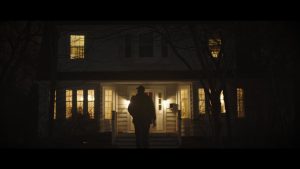
A still from INVADER
HtN: Yeah. The film’s very political without being political. I was trying to explain it to my wife. I was like, “It’s like he got the ingredients to make a cake, and he put all the ingredients on the table and then just challenged me, `so do something with that.’ Oh, okay. I guess I’m supposed to put this together myself, and I don’t know that I’m supposed to be making a cake. Or maybe I’ll end up making the cake, or maybe I just assume I’m going to make a cake, based on what the ingredients are. I love that.
MK: Yes. Well, thank you. That’s the effort that I really do try to do with my films. I’ve been accused of being vague, maybe style over substance, in terms of not fleshing out elements of stories to be this kind of coagulated thing at the time. The ultimate answer to that is that that’s what really intrigues me.
HtN: I would say it’s not style over substance, it’s style as substance.
MK: Well, thank you. Yes.
HtN: I think with your films, sometimes the mood is more important than the dialogue.
MK: For sure.
HtN: Sometimes there’s brutality in setting. There’s brutality in where you put the camera.
MK: Right, right. A movie like Trash Humpers — I’m a huge Harmony Korine fan — but it’s so aggressively stating something, its own intention, that you can’t help but admire it a little bit. There’s a little bit of that in there, I think.
HtN: Yeah, absolutely. So, obviously, as a transgender journalist, I’m hypersensitive to problematic tropes in movies. I think one of the classic tropes is the Serial killer as Creepy Crossdresser. Maybe it started with Psycho. We saw it in Dressed to Kill from De Palma, Silence of the Lambs, Sleepaway Camp. Your antagonist wears a female mask and a blonde wig and wears a latex body suit. I don’t know if I’m revealing too much by saying that. I mean, it’s like ten minutes into the movie, so it’s not that hidden. Can you talk a little bit about that decision?
MK: Yes, absolutely. First off, I get that, and I totally can understand where you’re coming from, 100%. From my perspective, first and foremost, [the serial killer] BTK was a huge inspiration. If you look up his Polaroids that he took before he actually became a killer, that mask is pretty spot on. Then more so, Invader the character is almost this virus entity that goes into somewhere and absorbs something that he finds fascinating, and takes it with him and carries it with him. So, in the very beginning when he’s murdering the house, he discovers the fetish outfit, and I thought that was really a nice interesting intrigue moment for him. Then later in the film, obviously, he discovers the Polaroids, and that becomes another level of obsession. I always wanted to certainly steer away from something like Dressed to Kill and not be necessarily explicit about anything in that regard, but it was very exciting to be like, look, he found something when he was destroying someone’s life and he takes it with him.
HtN: He invades their home, not only, but he invades their life, so he’s going through their private stuff, and there’s nothing more private than a kink that someone has in their closet. He’s going into the most private thing they have and taking it on. He’s invading. With the latex, he’s invading their skin a little bit. He’s putting a mask on. He’s invading their body.
MK: Absolutely. It was very important to me to open the movie with the element of completely murdering a house and taking people’s things. [Michael] Haneke said about The Seventh Continent that one of the most taboo things that he could do was show them ripping up money and flushing it down the toilet. For this generation and the next generation, I thought it would be extremely violating to show somebody’s house being completely gutted and murdered from the inside, because homeownership for me, it’s a fantasy now at this point. That’s not ever going to happen, so a character who could be that vile as to really just tear apart and take on is something that I think is very, very troubling. I think that’s ultimately where we landed on it. I do understand, and from the beginning had the sensitivity to that for sure.
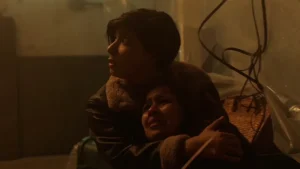
A still from INVADER
HtN: Yeah. Obviously I’m sitting here talking to you, so I wouldn’t be doing that if I didn’t think there was something else going on. That’s I think what’s always great about your movies — you don’t spell everything out, but you challenge people. I think with Invader the whole time I’m asking, “Well, who is the invader?” Because Trump is calling anybody who comes across the border invaders. I don’t know who he would side with, with this movie. I mean, he hates trans people, so he wouldn’t like the Invader either. Your main character is clearly not from America. I think that right now we would be demonizing her and saying, “Well, what is she doing in this country? Maybe she needs to go back.” Certainly, the manager in the grocery store treats her like that. I liked that I didn’t know much about who the Invader was. He was, like you said, a virus. He’s more foreign to me than the foreigner.
MK: Joe Swanberg, who I really admire as a filmmaker so much because he is a producer. Early on, I talked to Joe and I said, “What do you want Invader to be, because you’re embodying him?” He said, “Let’s dovetail it. Let’s begin and let’s end and offer these snippets in, but that’s ultimately not important.” It’s more important as to trying to connect the pieces and the clues. So he gave us the courage to offer that intrigue, more than somebody who wants to have a great relationship with some slate company that’s going to finance eight movies, and so just wants to make the most commercial thing possible.
HtN: Right. No, you’ve never been interested in that, which is good. I mean, with the briskness of the film, you don’t really a chance to catch up, let alone tie everything up nicely. The film is just so unforgivingly intense and it’s done before you want it to be done, really. I’m like “Well, wait a minute. All my fears have not been settled by the end of this film.”
MK: I think one of the things that I’ve tried to grow as a filmmaker has been just understanding and letting the movie tell us what it’s supposed to be in terms of anything like run time or style. There’s a world where this could be a much more conventional film, every couple beats you unfold more, but that’s not super interesting to me. We had a 90-minute cut of the film, and then we just kept shaving it and shaving it and shaving it.
HtN: Oh, I love that. We don’t always know why somebody is the way they are. You can look into somebody’s eyes for a very long time and still not know them.
MK: Absolutely. That’s one of those things that we wanted to really establish with the scene where the cop knocks on the door. It’s like he’s drinking a beer, he’s got a filthy shirt on, but somehow … it’s obviously privilege but it’s also oversight by the cops … he’s able to just infiltrate.
– Bears Rebecca Fonté (@bearsrebecca.bsky.social)








